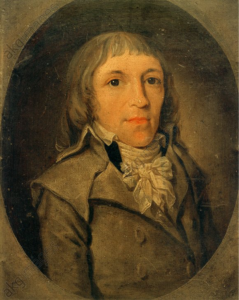About Ida
(Poet's title: Von Ida)
Set by Schubert:
D 228
[July 7, 1815]
Part of Kosegarten (putative cycle)
Der Morgen blüht;
Der Osten glüht;
Es lächelt aus dem dünnen Flor
Die Sonne matt und krank hervor,
Denn, ach, mein Liebling flieht!
Auf welcher Flur,
Auf wessen Spur,
So fern von Iden wallst du itzt,
O du, der ganz mein Herz besitzt,
Du Liebling der Natur?
Vernimmst du auch
Im Morgenhauch
Das Ach, das Idens Brust entächzt,
Das Sehnen, drin ihr Herz zerlechzt,
Im kühlen Morgenhauch?
Was ahnest du,
Der Idens Ruh
Und Idens Freuden mit sich nahm?
Ach, ahnest du wohl Idens Gram
Und flehst für Idens Ruh?
O kehre um!
Kehr um, kehr um!
Zu deiner Einsamtraurenden!
Zu deiner Ahnungschaurenden!
Mein Einziger, kehr um!
Morning is blossoming,
The East is glowing;
Smiling out of the fine veil of mist
Is the sun, languid and sickly.
Because, oh no, my darling has fled!
On which field,
In whose traces,
Are you now wandering, so far from Ida,
Oh you, who possess all of my heart,
You darling of nature?
Can you also hear
In the morning breath
The sigh which Ida’s breast emits,
The longing that is craving within her heart
In the cool breath of the morning?
What awareness do you have
Of Ida’s rest
And of Ida’s joy, which you have taken with you?
And can you really sense Ida’s grief,
And do you plead for Ida to find rest?
Oh, come back!
Turn back, come back!
To your sad lonely one!
To your Ida as she recoils in dread!
My only one, come back!
All translations into English that appear on this website, unless otherwise stated, are by Malcolm Wren. You are free to use them on condition that you acknowledge Malcolm Wren as the translator and schubertsong.uk as the source. Unless otherwise stated, the comments and essays that appear after the texts and translations are by Malcolm Wren and are © Copyright.
☙
Themes and images in this text:
Being solitary, alone and lonely Breath and breathing Chest / breast East and West Fields and meadows Fire Fleeing Flowers Hearts Longing and yearning Mist and fog Morning and morning songs Sighs and sighing Smiling The sun Veils Walking and wandering Wind
Ida sees the morning as both clashing with and reflecting her condition. How dare the sun emerge and shine as if nothing has happened? Oh, I see, the sun is actually pale and sickly. That is more like it. She can only see things through the prism of her pain and loss.
Even the slightest morning breeze carries the sounds of her sighing. Every waft of air is her expiring. She asks questions about what her beloved is doing and where he has gone but she does not wait for an answer because everything around her is full of the pain of her abandonment.
Literary critics might call this ‘the pathetic fallacy’ (the conviction that the whole environment reflects and embodies a character’s emotions), but people who are experiencing such pain cannot possibly experience it as any form of delusion. Within this text, there is no way of seeing things other than through Ida’s feelings. It may well be that the beloved who has left was not even aware of her existence, let alone her (possibly repressed, probably undeclared) passion. All that we are left with is the world as she knows it. It is not really about the new morning or what the beloved is actually doing; it is all about her. The clue is there in the poem’s title, ‘About Ida’.
☙
Original Spelling Von Ida Der Morgen blüht; Der Osten glüht; Es lächelt aus dem dünnen Flor Die Sonne matt und krank hervor. Denn, ach, mein Liebling flieht! Auf welcher Flur, Auf wessen Spur, So fern von Iden wallst du itzt, O du, der ganz mein Herz besitzt, Du Liebling der Natur? Vernimmst du auch Im Morgenhauch Das Ach, das Idens Brust entächzt, Das Sehnen, drinn ihr Herz zerlechzt, Im kühlen Morgenhauch? Was ahnest du, Der Idens Ruh Und Idens Freuden mit sich nahm? Ach, ahnest du wohl Idens Gram, Und flehst für Idens Ruh? O kehre um! Kehr' um, kehr' um! Zu deiner Einsamtraurenden! Zu deiner Ahnungschaurenden! Mein Einziger, kehr' um!
Confirmed by Peter Rastl with L.T.Kosegarten’s Poesieen, Neueste Auflage, Zweyter Band, Berlin 1803, pages 120-121. This is the source used by Schubert. Kosegarten’s poem is different in later editions and has the title “Von Agnes”
To see an early edition of the text, go to page 120 [124 von 298] here: http://digital.onb.ac.at/OnbViewer/viewer.faces?doc=ABO_%2BZ184217005


